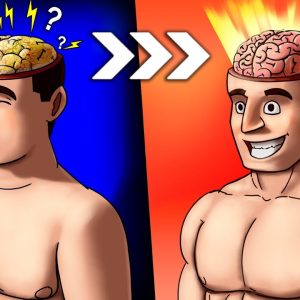Learn what happens to your brain when you exercise. The brain-changing benefits of exercise extend much further than most would think. Exercise can dramatically improve your learning, memory, mood, and much more. It can reduce anxiety and help with depression. Just by starting to exercise you can improve the function and power of your brain.
🔥 FREE 6 Week Shred: https://GravityTransformation.com
📲 FREE Diet/Workout Planner Tool: http://bit.ly/2N41lTX
When we think of exercise we think of building muscle, burning fat, and getting into better shape. But working out has some pretty miraculous effects on things like your hormones, your nervous system, your body chemistry, and especially on your brain. This is why simply exercising consistently can help improve all areas of your life whether we’re talking about finances education or just your mood. And even if you haven’t been exercising, you can experience many of the amazing benefits really quickly.
And the first often overlooked benefit for your brain is just how much exercise can help you learn better and faster. Turns out the common quote, “all brawn, and no brains” couldn’t be further from the truth. In fact, all across the world, research shows that students with higher fitness scores also have higher test scores. (1.5) That’s because being physically active ends up having a positive influence on things like concentration, focus, and learning ability. And much of this boost in learning ability is thanks to something known as brain-derived neurotrophic factor or bdnf. And to simplify it the stress from exercise leads your brain to create new cells which is a necessary step in the learning process. Exercise directly increases the production of protein in the brain, which in turn promotes the growth of neurons. It also promotes the connection between the neurons and allows them to send signals and communicate with each other more efficiently. BDNF is just one of these proteins that get boosted when you exercise, but it’s also arguably the most important when it comes to learning. That’s why BDNF has been called “Miracle Grow For Your Brain.” And since exercise boosts the production of bdnf it helps explain how researchers noticed that people are able to learn vocabulary 20 percent faster after intense physical exercise. (2.5) So if you want to learn something new, working out is probably the last thing on your mind, but it turns out it can drastically help, especially when we consider its effect over time.
And another one of those effects is Improved Emotional Regulation. Which essentially boils down to how you handle your emotions. This is, of course, an important skill because being able to control emotions such as anger, sadness, or hunger is better than being taken over by them and being run by them And luckily, exercise can help with this, as shown by a 2019 study. (25) In this study, researchers “examined the effect[s] of [an] 8-week mind-body exercise intervention that combined jogging and mindfulness-based yoga, and researchers wanted to see the effect this had on implicit emotion regulation.” (26) By the end of the study the researchers concluded that “Eight weeks of mind-body exercise intervention does, in fact, improve implicit emotion regulation ability.” (27) They also mentioned that “improved aerobic fitness could predict even greater improvement of implicit emotion regulation ability.” (28) In other words, if you want to improve your emotion regulation, exercise – and especially aerobic exercise can really help. Also, keep in mind Even if you’re not exercising now you can feel these effects on your mood and emotions pretty quickly since this study only lasted eight weeks and the participants were already able to feel major benefits in that short time frame.
Next, let’s talk about how it affects your memory. In a study from the University of British Columbia, researchers found that regular aerobic exercise, the kind that gets your heart and your sweat glands pumping, boosts the size of the hippocampus. (16) This is the portion of the brain involved in verbal memory and learning. When functioning properly, it helps you memorize and learn things, meanwhile, any kind of disfunction with the hippocampus can lead to major diseases like Alzheimer’s disease. Interestingly, the study did not find the same benefits for resistance training. So, if you want to improve your memory you’ll most likely have to add some cardiovascular training to your workout routine. Which I highly recommend, just make sure you’re not overdoing it if your goal is to also maximize muscle growth, as too much cardio can interfere with your resistance training. But aside from that the Harvard medical school also noticed that exercise can benefit memory in other direct and indirect means. (17) They stated that the direct benefits come from “its ability to reduce insulin resistance, reduce inflammation, and stimulate the release of growth factors. These growth….



